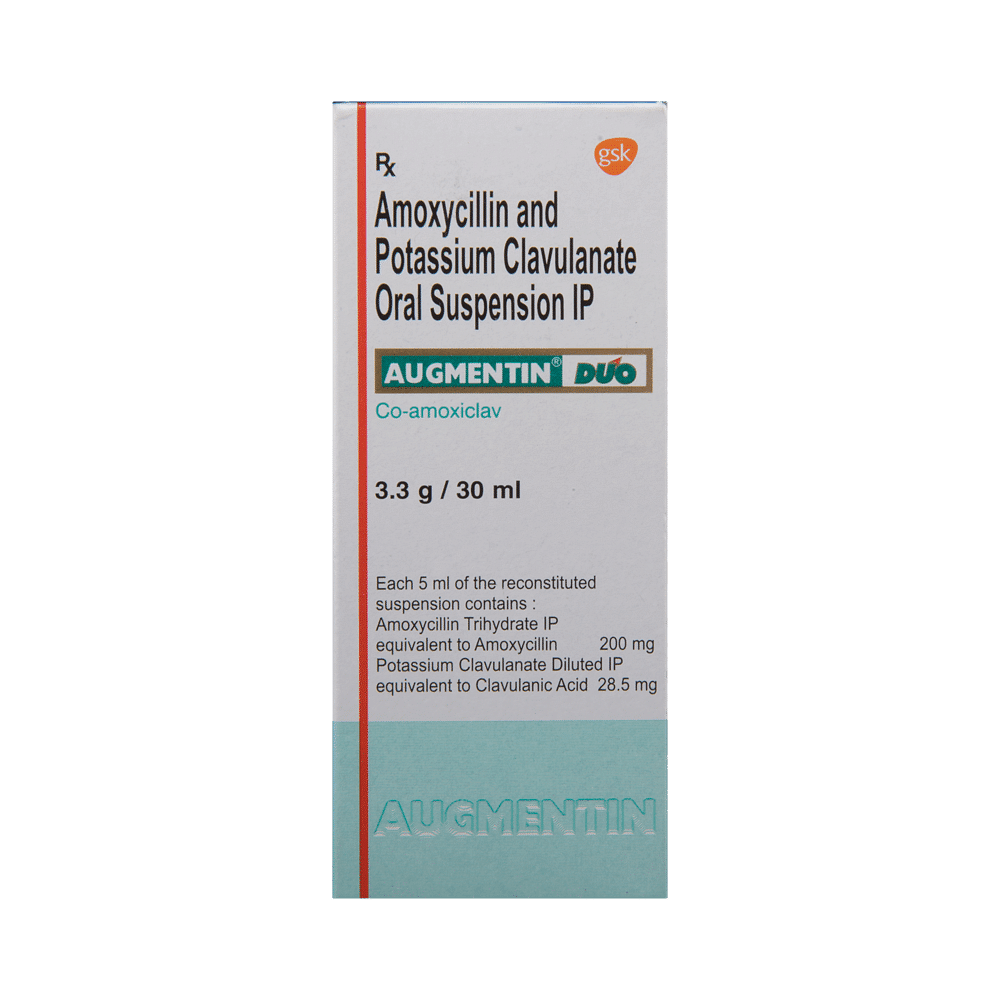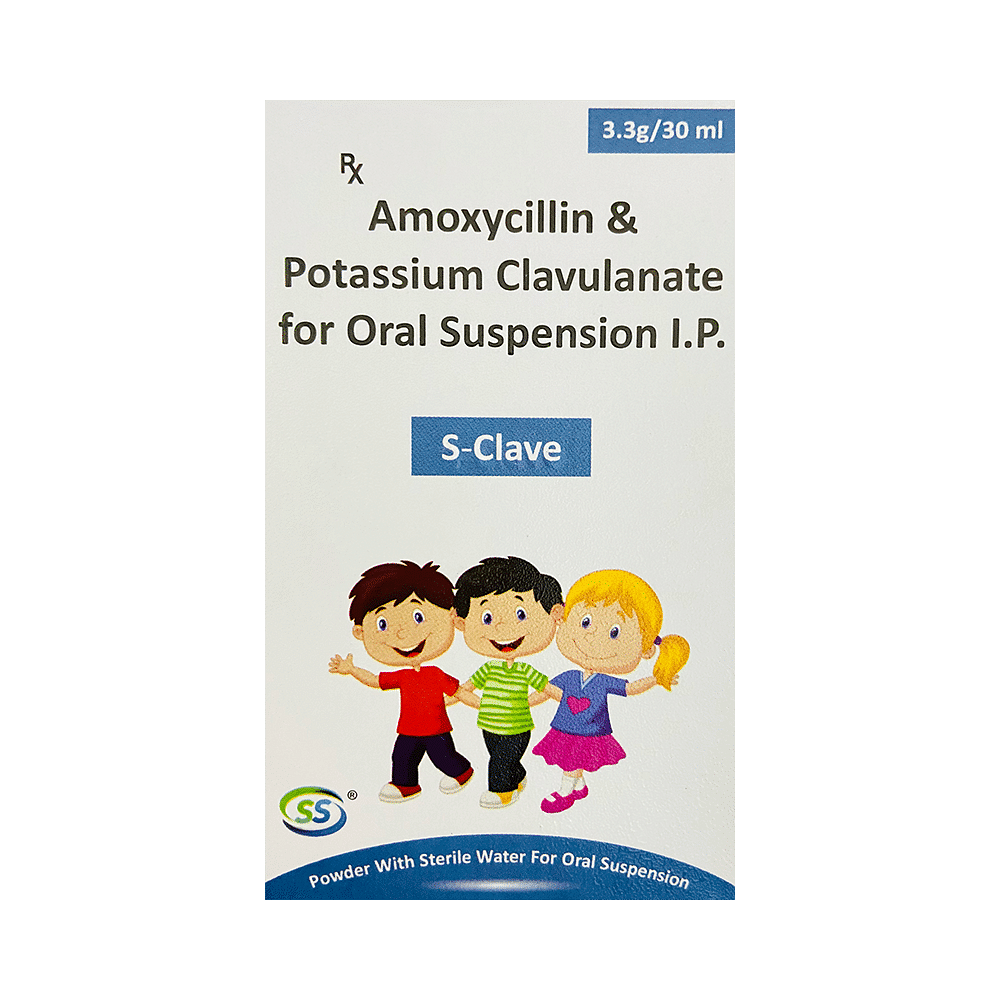
Foliclav 228.5 Oral Suspension
Manufacturer
Stayer Pharma Pvt Ltd
Salt Composition
Amoxycillin (200mg) + Clavulanic Acid (28.5mg)
Key Information
Short Description
Foliclav 228.5 Oral Suspension is an antibiotic medicine that helps treat bacterial infections of the ear, nose, throat, chest, lungs, teeth, skin, and urinary tract.
Dosage Form
Oral Suspension
Introduction
Foliclav 228.5 Oral Suspension is an antibiotic medicine that helps treat bacterial infections of the ear, nose, throat, chest, lungs, teeth, skin, and urinary tract. It is capable of killing bacteria that have become resistant to other therapies and thus also helps treat tuberculosis that is resistant to other treatments.
Directions for Use
Never give Foliclav 228.5 Oral Suspension to anyone else even if they show similar symptoms. Check 'expiry' before giving Foliclav 228.5 Oral Suspension to your child. Immediately discard all the expired medicines.
Safety Information
Side Effects
No common side effects listed.
How it works
Foliclav 228.5 Oral Suspension is an antibiotic. It has two active agents amoxycillin and clavulanic acid. Amoxycillin works by preventing the formation of the bacterial protective covering (cell wall) essential for the survival of the bacteria. Whereas clavulanic acid serves a special purpose of inhibiting an enzyme (beta-lactamase) that is produced by resistant bacteria.
Quick Tips
Stop Foliclav 228.5 Oral Suspension immediately if your child develops an itchy rash, facial swelling, or breathing difficulty. Report to the doctor without any delay.
Related Medicines

Augmentin Duo Suspension

Ziclave Oral Suspension

Moxtrio CV Oral Suspension

K-Mox-CV Dry Syrup

Eeclav Dry Syrup

Glyph-CV Dry Syrup

Pepylav Dry Syrup

Asomax C Oral Suspension

S-Clave Oral Suspension

Nojinox Oral Suspension
Frequently asked questions
Can other medicines be given at the same time as Foliclav 228.5 Oral Suspension?
It's crucial to consult with your child's doctor before giving any medicine alongside Foliclav 228.5 Oral Suspension, including potential interactions with prescribed medications or supplements. Discussing all possible medications and ingredients is essential for safe usage.
Can I get my child vaccinated while on treatment with Foliclav 228.5 Oral Suspension?
Antibiotics usually don't interfere with the components of vaccines or cause adverse reactions in children who have recently received vaccinations. However, it's recommended to delay vaccination until your child is fully recovered from any illness, as a precaution.
Which lab tests may my child undergo while taking Foliclav 228.5 Oral Suspension on a long-term basis?
Periodic monitoring of kidney and liver function tests might be recommended during prolonged treatment with this medication to ensure your child's overall well-being.
Can I give a higher than the recommended dose of Foliclav 228.5 Oral Suspension to my child?
Exceeding the recommended dosage of this medication may increase the risk of potential side effects. If your child experiences heightened symptoms, please consult with their doctor for a re-evaluation.
Can I stop giving Foliclav 228.5 Oral Suspension to my child when the symptoms are relieved?
No, discontinue this medication only after your child's physician has concluded the full course of treatment. Even if you experience relief from symptoms, it is crucial to continue the prescribed dose for the remaining duration as there may be beneficial effects even beyond immediate symptom improvement.
Can the use of Foliclav 228.5 Oral Suspension cause diarrhea?
Yes, Foliclav 228.5 Oral Suspension might lead to diarrhea. This is because it's an antibiotic that kills harmful bacteria. Additionally, this medicine may also influence the beneficial bacteria in your child's stomach and contribute to diarrhea. If diarrhea occurs, encourage your child to drink fluids and consult with their doctor for any persistent or concerning symptoms like dehydration (reduced urination frequency, dark-colored urine).
Do all viral common colds result in secondary bacterial infection?
Most viral colds don't directly lead to secondary bacterial infections. In fact, giving antibiotics to a viral infection could potentially increase your child's risk of experiencing adverse effects.
The mucus coming out of my child’s nose is yellow-green. Is it a sign of a bacterial infection?
Yellow or green mucus in the nose usually doesn't indicate that antibiotics are needed during a typical cold. It's common for mucus to thicken and change color (from clear to yellow/green) during colds. Symptoms typically subside after 7-10 days.
Is there any sign which shows that my child needs immediate medical attention?
If your child experiences serious allergic reactions such as difficulty breathing or skin rashes, gastrointestinal distress including diarrhea, and liver damage (including weakness, pallor, vomiting), seek immediate medical attention from a qualified doctor. While these side effects are rare, they require prompt intervention.


